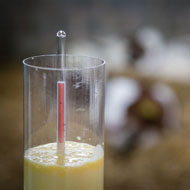
Resources to help farmers with colostrum management
A new campaign is hoping to reduce antibiotic use in farm animals by promoting the ‘liquid gold’ properties of colostrum.
The #ColostrumIsGold campaign was created by the Responsible Use of Medicines in Agriculture (RUMA) Alliance. Farmers are being urged to ensure newborn calves, lambs and piglets receive the correct amount of colostrum within a couple of hours of birth.
As part of the campaign, a range of organisations will be releasing information and promoting best practice throughout February. The information website FarmAntibiotics.org will signpost to these resources and offer tips on more effective colostrum management.
Calves that do not receive sufficient colostrum at birth are more than twice as likely to develop respiratory disease and may suffer mortality rates as high as 13 per cent.
Specialist sheep vet Dr Fiona Lovatt said the sector should not be relying on the use of preventative antibiotics. Giving lambs insufficient colostrum at birth is responsible for one of the industry’s biggest ‘hotspots’ in antibiotic use.
“And it’s largely avoidable,” she added. “The reality is that we simply don’t see Watery Mouth in lambs that have taken sufficient colostrum on board in that golden 24-hour window immediately after birth.
For essential levels of natural immunity, she said a 5kg lamb needs one litre of colostrum during its first 24 hours of life - but the first feed must take place within two hours of birth.
Pig specialist and veterinary lead at AHDB, Dr Mandy Nevel, said piglets need colostrum to maintain body temperature and protect them from disease. Born wet and with very little energy reserve, they require a feed within the first 30 minutes to prevent hypothermia and provide essential immunity.
“Sow vaccination is the best way to boost antibody levels in the colostrum,” she added. “That is why piglets who receive good levels of colostrum early will also be the healthiest at weaning. That extra care in the first hours of life will really make a difference.”
Post-weaning diarrhoea and respiratory disease were identified as longer term threats for piglets receiving insufficient colostrum at birth. Dr Nevel said colostrum offers a “golden opportunity” for reducing antibiotic use and ensuring healthier animals.
Vets and farmers looking for more information will be able to search the #ColostrumIsGold hashtag on Twitter or go to the FarmAntibiotics.org website from 1 February.
Image courtesy of RUMA



 The latest
The latest